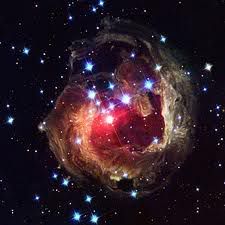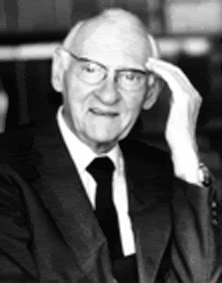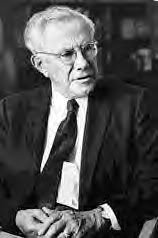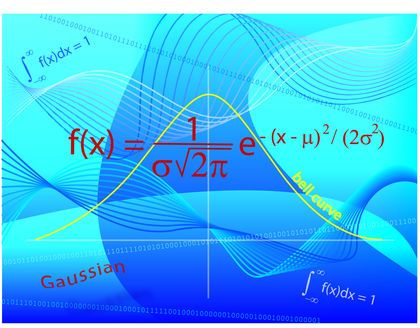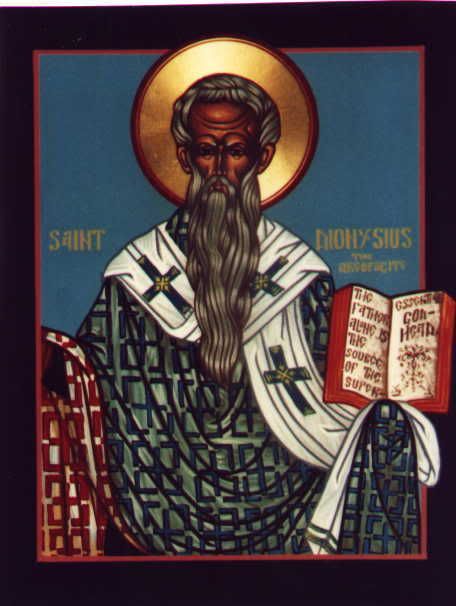
Pseudo-Dionysius the Areopagite (around 500AD)
Most people tend to think of God s a big man on a throne. They judge God by human standards. Like Dawkins argument that God would be more complex than his universe and thus less likely to exit. This is based entirely upon the idea that God is a magnified version of humanity. When I point this out atheists scoff and insist that most people see God this way we Christian apologists have to as well. When I point out that Paul Tillich had this totally different view of God as being itself they insist that this is not a Christian concept.
Paul Tillich the great theologian of the 20th century, was most noted for his seemly radical idea that God is "Being itself" or the ground of being, just what that means is very hard to put into words. Essentially it means that God is not a being but the basis of what being is, being itself. There are no good analogies but the best I've come up with is like the difference between architecture and a single house. It is not a house but the basis upon which houses are built. This is important as a distinction because atheists are always trying to judge God by human standards to treat God as though he just magnified humanity. All of the criticisms they make of religious belief revolve around the notion of God as a big man. The true Christian concept of God is more than that; and this the "true Christian concept" because it is the view of the Orthodox church from a time before the split with the West. Most commentators on Tillich wont say this but I think I have an original observation that Tillich was trying to translate Dionysus the Areopagite into existentialism. That is to say ancinet neo-Platonism into modern existentialism. Notice the similarity in the ideas: compare this with last post.
Dionysus The Areopagite (500)
The Author claims to be Paul’s companion in Acts, but due to the almost complete infusion of neo-Platonism throughout the text, the writings have been placed near the end of the fourth or early part of the fifth century. This is largely due to the influence of pagan philosophers Proclus (lecturing in Athens around 430 AD). The true name of the author is unknown he was probably a monk, believed to have lived in Syria. His writings have been extremely influential; he in essence kicked of the whole tradition of Christian mysticism. He founds the basic foundation for Gregory and Eastern Orthodox figures quoted above. The ideas of “Pseudo Dionysus” as he is most often known in the west, are set down in a long introduction by the translator Clearance Edwin Rolt. Rolt died at thirty-seven and this was his only book, but he had been hailed as one of the finest scholars ever produced by Queens College. Thus I think it only fair that we quote from the man himself. The major concept in which turns all Dionysus has to say is daubed by Rolt as the Super Essential Godhead:
The basis of their teaching is the doctrine of the Super-Essential Godhead (ὑπερούσιος θεαρχία). We must, therefore, at the very outset fix the meaning of this term. Now the word “Essence” or “Being” (οὐσία) means almost invariably an individual existence; more especially a person, since such is the highest type that individual existence can in this world assume. And, in fact, like the English word “Being,” it may without qualification be used to mean an angel. Since, then, the highest connotation of the term “Essence” or “Being” is a person, it follows that by “Super-Essence” is intended “Supra-Personality.” And hence the doctrine of the Super-Essential Godhead simply means that God is, in His ultimate Nature, Supra-Personal.
Now an individual person is one who distinguishes himself from the rest of the world. I am a person because I can say: “I am I and I am not you.” Personality thus consists in the faculty of knowing oneself to be one individual among others. And thus, by its very nature, Personality is (on one side of its being, at least) a finite thing. The very essence of my personal state lies in the fact that I am not the whole universe but a member thereof.
God, on the other hand, is Supra-Personal because He is infinite. He is not one Being among others, but in His ultimate nature dwells on a plane where there is nothing whatever beside Himself. The only kind of consciousness we may attribute to Him is what can but be described as an Universal Consciousness. He does not distinguish Himself from us; for were we caught up on to that level we should be wholly transformed into Him. And yet we distinguish between ourselves and Him because from our lower plane of finite Being we look up and see that ultimate level beyond us. The Super-Essential Godhead is, in fact, precisely that which modern philosophy describes as the Absolute. Behind the diversities of this world there must be an Ultimate Unity. And this Ultimate Unity must contain in an undifferentiated condition all the riches of consciousness, life, and existence which are dispersed in broken fragments throughout the world. Yet It is not a particular Consciousness or a particular Existence. It is certainly not Unconscious, Dead or, in the ordinary sense, non-Existent, for all these terms imply something below instead of above the states to which they are opposed.
We can see in that description several features which correspond to the things Tillich says. One interesting discussion that I close before it is started is the “personal” aspects. I am saving that discussion for its own chapter on Being itself and consciousness. The first point of interest is the connection between being and essence. He defines ousia as either one. Ousia of course is the root words of homoousios. Rolt confirms Tillich’s view in saying that essence refers to a particular existence, but the Super Essential is in contrast to an individual person. God is beyond the consciousness of an individual, but is in fact a universal consciousness that is in all things and can identify with all beings. I’ve already dealt with Tillich’s nix on pantheism; this is not a pantheistic idea. Yet in defining it Rolt deals with many of the aspects of God as being iself expressed by Tillich. God is infinite, God is not one person among others, transcendent of all we know and dwells on a plane beyond our understanding. The term “Super Essential” can be understood as “ground of being” or “Being itself.” They are basically saying the same thing. The Greek phrase he uses for “Super-Essential Godhead” is ‘humperusios Thearkia: Super means “over” or “transcendent” a structure over something else, such as “superstructure.” Thearkia is commonly the term in the NT for “Godhead.” What is being communicated is the notion of transcendence but also the transcendental signifier, the overview to the ordering of meaning and order, that is equivalent to the concept of a ground, of course as pointed out, essential has an affinity with being. Thus we could as well translate it “ground of being.” The concept of God as “Ground of Being” is the concept of “Super Essential” God. I don’t suggest that “ground” would be a good translation as translations go, but I do think it’s hinting at the same idea.
Pseudo Dionysius himself begins by embracing the vita negative, God is beyond our understanding, we don’t try to say what God is, we experience what God is (mystical union) we say what God is not and infer from that the truth, except where we are given clear understanding in Scripture. “We must not then dare to speak, or indeed to form any conception of the hidden Super-Essential Godhead, except those things that are revealed to us from the Holy Scriptures. For a Super-Essential understanding of it is proper to unknowning which lieth at the Super-Essence thereof surpassing discourse, intuition, and Being.” The translator capitalizes being.
The one who is beyond thought surpasses the apprehension of thought; the good which is beyond utterance surpasses the reach of words. Yea, it is a unity which is the unifying source of all unity and a Super-Essential Essence, a Mind beyond the reach of mind and Word beyond utterance, Eluding Discourse, intuition, Name and every kind of being. It is the universal cause of existence while itself existing not for it is beyond all being and such that it alone could give, with proper understanding thereof, a revelation of itself.(52)
Notice that this appears to be where Tillich obtains his usage of the term “existence,” and the distinction that God does not exist. What is puzzling is that while Tillich says God is beyond existence, because existence is for contingent things, and God is Being itself, identifies God with Being, Dionysus says God is beyond being. But then he is a full blown neo-Platonist. For him being is just reality and that is a copy of the true nature of things in which it participates. Tillich seems to move one step over from neo-Platonism toward modern existentialism. Dionysus tells us that we must make no expression or positive statement about the Super-Essential Godhead except those revealed in scripture for these are actually revealed by God. He tells us that “many writers thou wilt find who have declared that it [Super-Essential Godhead] is not only invisible and incomprehensible but also unreachable and past finding out since there is no trace of any that have penetrated the depth of its infinitude.” God reveals “itself” in stages commensurate with the powers of the subject for understanding. The notion that God is so wholly other, so transcendent of understanding is right in line with Tillich’s view. It’s clear Dionysius is a major source for Tillich’s existential ontology.
The upshot is that God transcends mere personhood. God is personal but is not "a person{ but is the origin of the personal. God is universal mind, meaning God is not nature but is the foundation of nature and can speak through nature and is present in nature (though his energies) and beyond it. God cannot be Judged by the standards of anything we know in nature although God knows each one of us better than we know ourselves.
Source:

